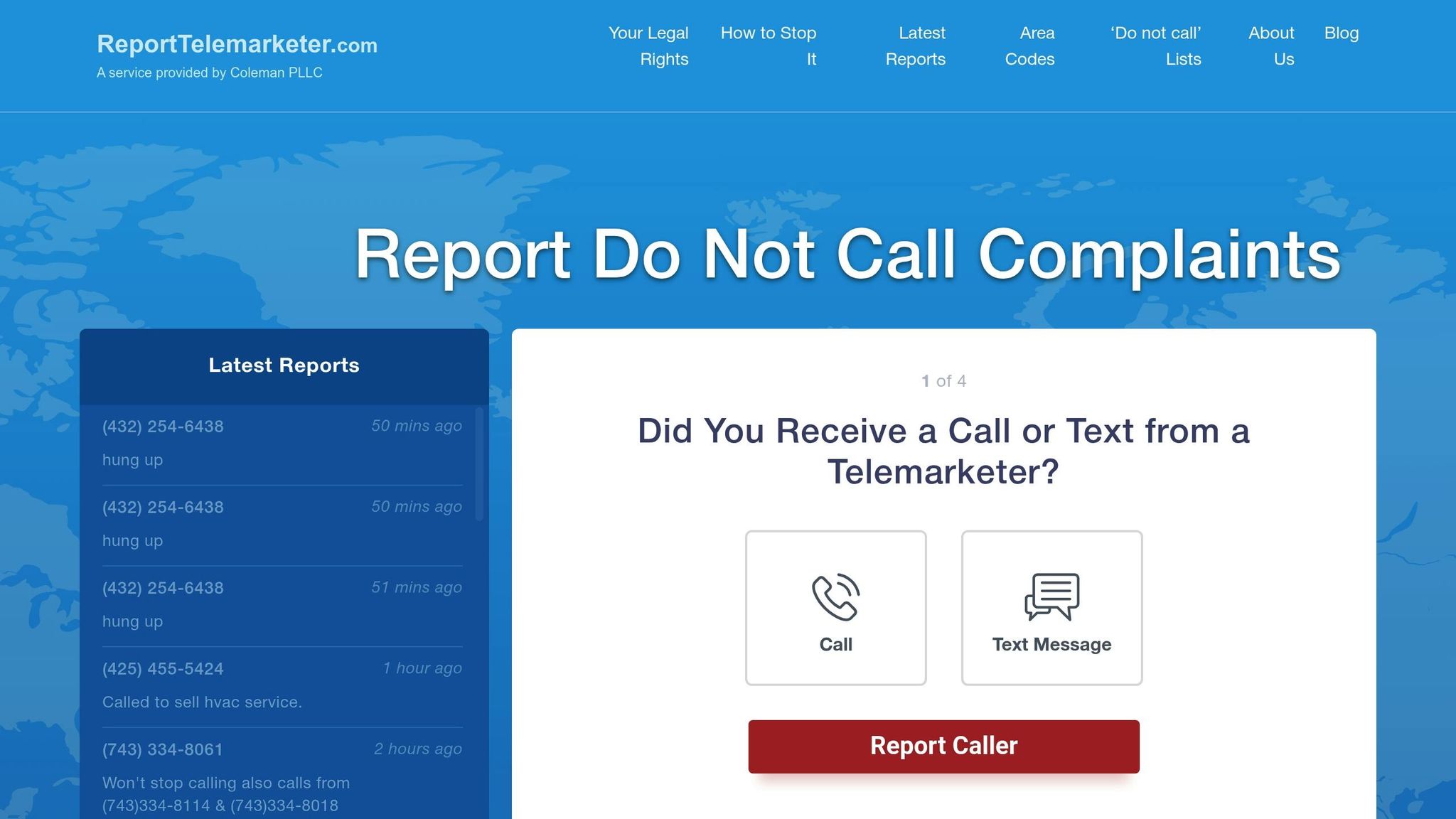
- Written Consent: Keep records of the consumer’s name, contact details, exact consent wording, date/time, and proof of consent (e.g., signed form or electronic record).
- Verbal Consent: Record audio or transcripts, date/time, and the agent’s ID who obtained the consent.
- Retention: Store all consent records securely for at least 5 years.
- Opt-Outs: Log opt-out requests immediately, update call lists within 24 hours, and retain these records for 5 years.
Consumers can report unwanted telemarketing calls at platforms like ReportTelemarketer.com, which investigates violations and takes action against non-compliant telemarketers.
Key takeaway: Properly documented consent records ensure compliance, reduce legal risks, and respect consumer preferences.
Unpacking the FTC’s Amendments to the TSR
Required Consent Documentation
Consent documentation is crucial for telemarketers to meet federal regulations. The type of consent – written or verbal – determines the specific record-keeping requirements.
Written Consent Records
For written consent, ensure records include:
- Consumer’s full name and contact information
- Exact wording of the consent and its purpose
- Date and time the consent was provided
- Proof of consent method, such as a signed form or an electronic record
Verbal Consent Records
When documenting verbal consent, make sure to record:
- An audio recording or transcript of the consent
- Date and time the consent was given
- Identification of the agent who obtained the consent
For details on how long to store these records and how to protect them, refer to the section on Record Storage and Time Requirements.
Record Storage and Time Requirements
According to the Telemarketing Sales Rule, telemarketers are required to keep all records of written and verbal consent for a minimum of five years. These records must be protected using encryption, access controls, and audit logs to ensure security and compliance. Below is an overview of the five-year retention requirement and the necessary data protection measures.
sbb-itb-a8d93e1
Compliance Guidelines
Telemarketers are required to securely store consent records for five years and set up processes for regular reviews and managing opt-out requests.
Record Review Process
To ensure consent records remain valid and accurate, regular audits are essential. These checks help verify that only approved contacts are made, reinforcing consumer confidence.
Key steps for audits:
- Conduct monthly reviews of all consent records.
- Confirm all required details are complete, including:
- Consumer contact details
- Date and time stamps
- Agent IDs for verbal consent
- Documentation of the consent method
- Identify and investigate any missing or incomplete information.
- Resolve discrepancies within five business days.
- Keep detailed records of audit findings and any corrective actions taken.
- Maintain audit logs to meet regulatory requirements.
Managing Consumer Opt-Outs
Respecting consumer preferences is equally important. Opt-out requests must be documented and processed quickly.
Steps for handling opt-outs:
- Log opt-out requests as soon as they are received.
- Include the following in the documentation:
- Date and time of the request
- Consumer’s contact details
- Method of opt-out (call, text, email)
- Name of the agent who processed the request
- Update all call lists within 24 hours.
- Retain opt-out records along with original consent records for five years.
- Use system blocks to prevent accidental contact with opted-out consumers.
- Perform weekly checks to ensure the opt-out list is accurate.
Accurate opt-out records help reduce complaints and provide a strong legal safeguard.
Legal Protection Through Records
A five-year archive of records offers businesses a layer of legal protection in various scenarios.
Records in Consumer Disputes
Consent records aren’t just about meeting regulatory requirements – they can also act as a defense in consumer disputes. These records demonstrate compliance with laws like the TCPA and TSR, offering businesses a way to protect themselves.
Properly kept records provide:
- Quick resolution of disputes with accessible consent logs
- Evidence of TCPA and TSR compliance during audits
- Support against claims of unauthorized contact
Ensure all consent records are stored in a secure digital archive. Include details like timestamps, consent scope, verification methods, and any changes in status for easy reference.
For consumers, platforms like ReportTelemarketer.com offer tools to address issues with unwanted calls.
ReportTelemarketer.com Services

ReportTelemarketer.com is a platform designed to help consumers deal with unwanted telemarketing calls when consent was not provided. It offers a structured process to handle non-compliant telemarketers:
- Investigation Process
The platform investigates calls to identify consent violations. - Legal Action
It can issue cease-and-desist letters, file formal complaints, and pursue enforcement to stop violations. - Consumer Protection
The service is built with consumers in mind and includes:- Free access for users
- No upfront costs
- Attorney fees recovered from telemarketers when applicable
This approach gives consumers an effective way to address unwanted calls and protect their rights.
Summary
Keep detailed, timestamped records of both written and verbal consent. Include specifics about the method of consent and any opt-out requests. Store these records securely for at least five years to ensure compliance and address potential disputes. Consumers who receive unwanted calls or texts can report violations at ReportTelemarketer.com for investigation and possible legal action.
FAQs
What steps can telemarketers take to securely store and manage consent records?
To ensure the security of consent records, telemarketers should adopt robust data protection practices. This includes storing records in encrypted digital formats to prevent unauthorized access and maintaining regular data backups to safeguard against loss. Access to these records should be restricted to authorized personnel only, with strong password protections and multi-factor authentication in place.
Additionally, telemarketers should comply with relevant privacy laws and regulations, such as the Telephone Consumer Protection Act (TCPA), and conduct periodic audits to ensure that their record-keeping systems remain secure and up to date. By implementing these measures, telemarketers can better protect consumer data and demonstrate compliance with legal requirements.
How can I confirm if a telemarketer has my consent to contact me?
Telemarketers are required by law to obtain your explicit consent before contacting you. If you’re unsure whether you gave consent, start by recalling if you signed up for any service, entered a contest, or agreed to marketing communications when providing your phone number.
You can also ask the telemarketer directly for proof of your consent. Legitimate telemarketers should be able to provide documentation showing when and how your consent was obtained. If they fail to do so or you suspect a violation, you can report the incident to a consumer protection service like ReportTelemarketer.com to investigate further.
What should I do if I think a telemarketer has broken consent rules?
If you suspect a telemarketer has violated consent regulations, you can take action by reporting the incident through ReportTelemarketer.com. Provide key details about the calls or texts, such as dates, times, and any relevant information about the telemarketer’s behavior.
ReportTelemarketer.com will investigate your report and, if a violation is confirmed, may take steps such as issuing a cease and desist letter or filing a formal complaint. The service is free for users, with attorney fees recovered from the telemarketers when applicable.